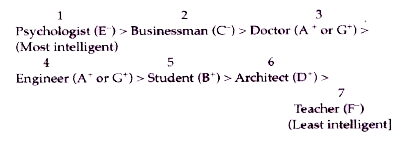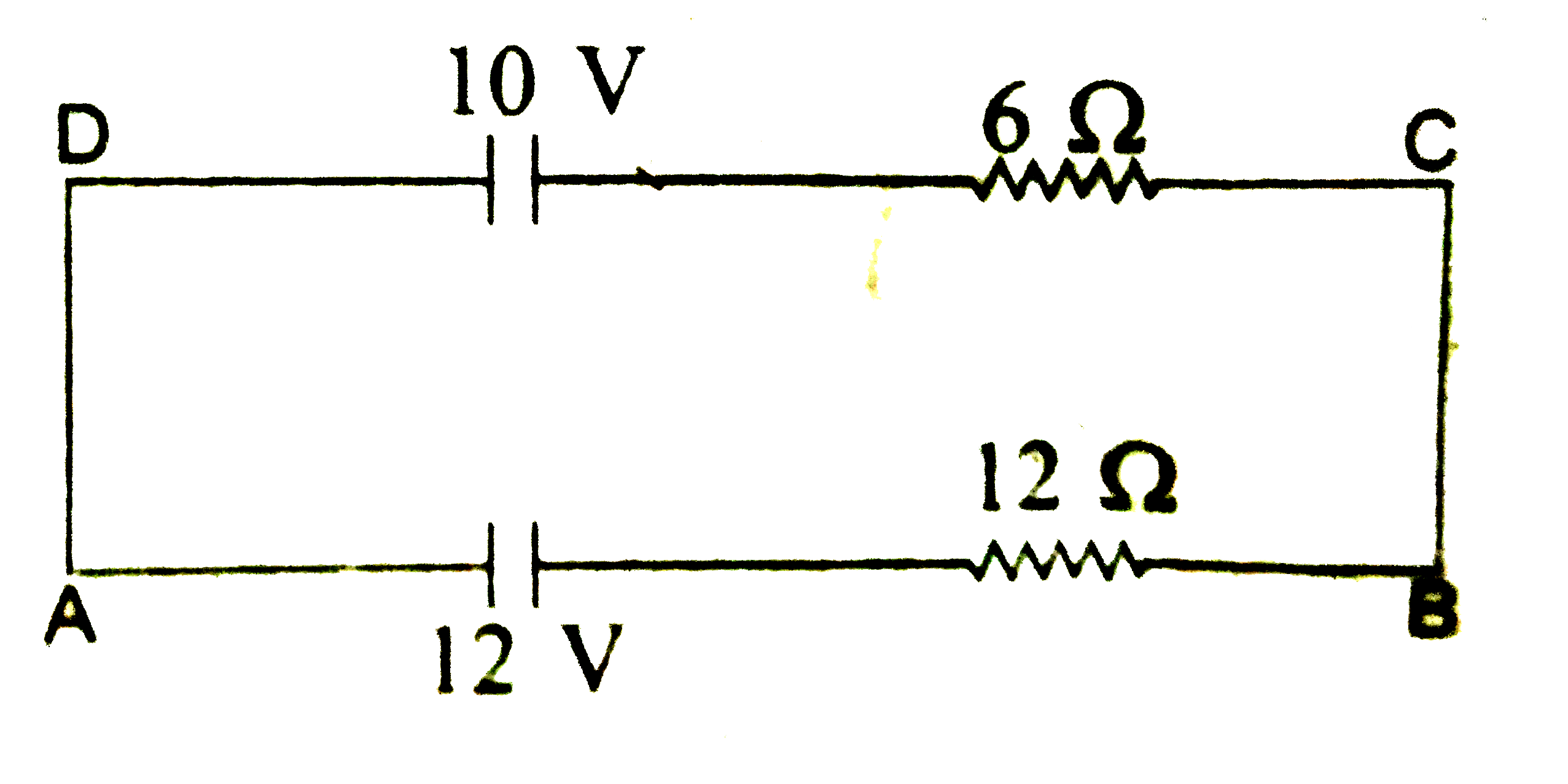Read the information given below and answer the questions that follow :
(i) There is a group of seven persons A, B, C, D, E, F, and G.
(ii) There are four males, three females, two married couples and three unmarried persons in the group.
(iii) The seven persons are seated in a row on the bench.
(iv) Their professions are : engineer, teacher, doctor, psychologist, businessman, architect and student.
(v) B is not married and another person the psychologist, is the most intelligent.
(vi) The engineer is married to the teacher who is the least intelligent of the group.
(vii) D is an architect. He is sitting on the left most corner.
(viii) The student is sitting on the right most corner of the bench.
(ix) The doctor is married to C. C is the second most intelligent of the group followed by her husband.
(x) (x) The least intelligent of the group is sitting on the immediate right of D, followed by the most intelligent.
(xi) There are as many more intelligent persons than the engineer as there are less intelligent.
(xii) On the bench, followed by D, there are three females sitting in succession.
(xiii) The psychologist is a female.
(xiv) The student is more intelligent than the architect, who is more intelligent than only one person, F.
(xv) Neither A nor G is a female.
Who is sitting on the immediate right of D?
F
E
C
Can't say
The correct Answer is:A
According to the given information:
Intelligence wise analysis :
From (v), we get
The psychologist ⇒ the most intelligent
From (vi), we get
The teacher ⇒ the least intelligent From
(ix), we get
Person C ⇒ the second most intelligent.
The daughter (husband of C) ⇒ the third most intelligent.
From (xi), we get
The engineer ⇒ the fourth most intelligent.
[becaise There are three persons more intelligent and three less intelligent than him]
From (xiv), we get
The student ⇒ the fifth most intelligent
D (the architect) ⇒ the sixth most intelligent.
F (the teacher) ⇒ the least intelligent.
Order of Intelligence in the decreasing sequence :

Seating wise analysis:
D on−−→, the left most corner. [From (vii)]
The student on−−→ the right most corner. [From (viii)]
F ⇒ to the immediate right of D.
[From (x)]
Psychologist ⇒ next to F. [From (x)]
C ⇒ next to Psychologist [From (xii)]
According to the given information, the seating arrangement is as follows:

By elimination, we get
C ⇒ the businessman.
So, final order of intelligence in the decreasing sequence is as follows:

Possible couples :
(i) Doctor (A+ or G+)⇔ Business man (C−) [From (ix)]
(ii) Engineer (A+ or G+)⇔ Teacher (F−) [From (vi)]
Final Seating arrangement :

[Note : (+)⇒ male and (−)⇒ Female. Also ⇔⇒ couple.]
By analysing the final seating arrangement, it is clear that F ⇒ to the immediate right of D.
Topper's Solved these Questions
- PROBLEM SOLVING (PUZZLES & SEATING ARRANGEMENT)BOOK - LUCENT PUBLICATIONCHAPTER - PROBLEM SOLVING (PUZZLES & SEATING ARRANGEMENT)EXERCISE - Exercise-1
46 Videos
- PROBLEM SOLVING (PUZZLES & SEATING ARRANGEMENT)BOOK - LUCENT PUBLICATIONCHAPTER - PROBLEM SOLVING (PUZZLES & SEATING ARRANGEMENT)EXERCISE - Exercise-2
47 Videos
- PASSAGE AND CONCLUSION BOOK - LUCENT PUBLICATIONCHAPTER - PASSAGE AND CONCLUSION EXERCISE - Exercise - 3
45 Videos
- ROWS AND RANKSBOOK - LUCENT PUBLICATIONCHAPTER - ROWS AND RANKSEXERCISE - Exercise (Type-IV : Miscellaneous)
2 Videos
Similar Questions
A B C D and E are five friends. A is shorter than B but taller than E. C is the tallest. D is shorter than B and taller than A. Who has two persons taller and two persons shorter than him/her ?
View SolutionStudy the following information carefully and answer the questions given below it.
Six lectures-A, B, C, D, E and F - are to be delivered from Monday to Sunday, one lecture every day.
(i) Lecture C cannot be delivered on Friday.
(ii) Lecture A is delivered immediately after lecture D.
(iii) There should be a gap of two days between the lectures B and F.
(iv) There is one holiday except Saturday. Lecture F is delivered on the next day of holiday.
(v) Lecture E is delivered on Wednesday and it is not immediately followed by lecture F.
On which day was lecture D delivered ?
View SolutionThe interest rates in the institutional market have come down significantly and at present are in the range of 5.25 to 5.75 percent per annum. However, interest rates on small savings schemes such as the Post Office Saving Schemes, RBI Relief Bonds, Provident Fund and PPF continue to be administered at high levels in relation to market rates. These schemes also have a variety of tax incentives, which result in much higher post-tax returns and on the flip side more liability for the government. It is ironic that it is predominantly the urban population (and more often people in the high tax bracket), which is benefiting from high rates and tax benefits. The size of small savings has assumed a significant proportion of financial saving in the country. This has also increased dramatically the debt service burden of both Central and State Governments.
The interest rates on small savings have decreased considerably during the last few years.
View SolutionIn a shop, the items are arranged in a shelf consisting of six rows. Biscuits are kept above the tins of chocolates but below the rows of packets of chips, cakes are at the bottom and the bottles of peppermints are below the chocolates. The topmost row had the display of jam bottles. where exactly are the bottles of peppermints? Mention the place from the top.
View Solutionतीन प्रतिरोध तार हैं। प्रत्येक का प्रतिरोध 4 ओम हैं। इनमें सम्भावित संयोजनों को प्रदर्शित कीजिए। तथा प्रत्येक संयोजन में तुल्य प्रतिरोध ज्ञात कीजिए।
View Solutionदिए गये विघुत परिपथ की सहायता से ज्ञात कीजिए
- (i) परिपथ में धारा , तथा
(ii) बिन्दु A तथा B के बीच विभवान्तर ।

View Solutionप्रत्यावर्ती वोल्टेज स्त्रोत V=V0sinωt से प्रेरकत्व L , धारिता C तथा प्रतिरोध R तीनो श्रेणीक्रम में जुड़े है सिद्ध कीजिए कि परिपथ कि प्रतिबाधा Z=√R2+(ωL−1ωC)2 तथा tanϕ=ωL−1ωCR जहाँ ϕ धारा तथा वोल्टेज के बीच कालान्तर है ।
View Solutionएक रेखिक समीकरण दी गई है । दो चरो में एक ऐसी और रेखिक समीकरण लिखिए ताकि प्राप्त युग्म का ज्यामितीय निरूपण जैसा कि:
(i)प्रतिच्छेद करती रेखाए हो।
(ii) समान्तर रेखाए हो।
(iii) सम्पती रेखाए हो|
View Solutionसिध्द कीजिए की c का एक ऐसा मान है जिसके लिए निकाय cx+3y=c−3 और 12x+cy=cके अपरिमित रूप से अनेक हल है इस मान ज्ञात कीजिए ।
View Solutionताशों की गड्डी से तीन ताश यदृच्छया खींचे जाते हैं उनमें से एक बादशाह, एक बेगम और एक गुलाम हो, इसकी प्रायिकता ज्ञात करो।
View Solutionअ के एक लाटरी में तीन शेयर हैं जिनमें 3 इनाम हैं तथा 6 रिक्त हैं। ब का एक लाटरी में 1 शेयर है जिसमें 1 इनाम तथा 2 रिक्त हैं। दिखाइये कि अ के जीतने की प्रायिकता का ब के जीतने की प्रायिकता से अनुपात 16 : 7 है।
View Solutionतीन तत्व A, B और C एक घनीय ठोस जलक में क्रिस्टलीकृत होते हैं । परमाणु A कोनो पर परमाणु B घन के केंद्र पर तथा परमाणु C किनारो पर स्थित होते हैं । यौगिक का सूत्र होगा :
View Solutionसमान चालकता सेल में लिए गए दो विलयनों A तथा B के प्रतिरोध क्रमशः 50 ओम तथा 100 ओम है । यदि A व B के सामान आयतन मिला दिए जाये तो सामान चालकता सेल में मिश्रण का प्रतिरोध क्या होगा ?
(मोल A व B को मिलाने पर वियोजन की मात्रा में कोई परिवर्तन नहीं होता है)
View Solutionनीचे कुछ अभिक्रियाएँ दी गयी है-
(a) ACl2+B→BCl2+A
(b) B+DCl→ कोई अभिक्रिया नहीं
(c) C+2DCl→2D+CCl2
(d) C+ECl2→ कोई अभिक्रिया नहीं
(e) H2+ECl2→2HCl+E
(f) H2+FCl2→ कोई अभिक्रिया नहीं
उपरोक्त दिए तत्वों (A से F) को रासायनिक सक्रियता के घटते क्रम में व्यवस्थित करो ।
View Solutionनिम्नलिखित कथनों पर विचार करें :
कथन I : यदि A और B प्रतिदर्श समष्टि S के संगत दो घटनाएँ ऐसा है कि P(A)=0.2 और P((B)=0⋅8 तो A⋃B एक सुनिश्चित घटना है |
कथन I : यदि A और B परस्पर अपवर्ती हों तो P(A)+P(B)=1 इन कथनो में :
View Solutionयदि A और B दो स्वतंत्र घटनाएँ हो तो
View Solution
